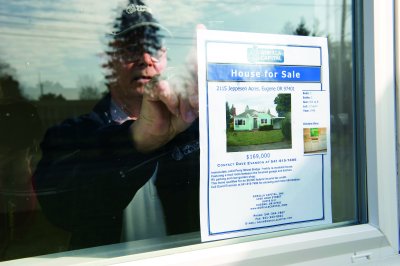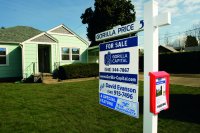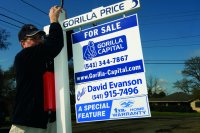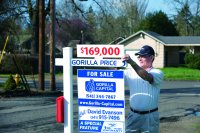Gorilla Capital is changing how homes are bought and sold and shaking up the real estate status quo.
Gorilla Capital is changing how homes are bought and sold and shaking up the real estate status quo.
BY BEN JACKLET
When he first started investing his dot-com money in Oregon foreclosures, John Helmick saw a lot of buyers monkeying around, but there was no gorilla.
 Gorilla strives to sell it’s homes for $20,000 less than the competition can. PHOTOS BY JON MEYERS |
He decided to change that.
In four years, Helmick’s Gorilla Capital has grown from a Eugene-based curiosity into the largest independent wholesale buyer of foreclosed homes in western Oregon, with annual revenues of $12 million and an expansion plan targeting foreclosure-plagued Phoenix. The company is on pace to buy 100 foreclosed homes in 2009, fix them, list them for well under $200,000 apiece and sell them. With a median turnaround from purchase to sale of about 50 days, Helmick is honing a model that he believes has great potential on a national scale, as homebuyers shift from dream homes to affordable homes.
“It’s a whole new way to deal with real estate,” he says.
If Helmick sounds like one of those hard-charging entrepreneurs from the 1990s, well, he is. That’s where the capital in Gorilla Capital comes from. A corporate lawyer with a business degree from University of Texas and a law degree from Yale, Helmick helped his brother, Robert, launch eCollege.com in 1996 and reaped major rewards when the company went public in 1999. He got into real estate because, “I was looking for something to do with my money.”
 |
Gorilla Capital CEO John Helmick (left) and VP Dave Evanson (below) put a home they bought at foreclosure on the market in Eugene |
 |
 |
 |
 |
 |
 |
 |
This Eugene home was on the market for just one weekend before selling. Opposite page: COO Ben Bazer checks in with Helmick |
 |
 |
Money always talks, but it is especially persuasive in the current economy. Helmick has leveraged his personal fortune through a partnership with Eugene-based Pacific Continental Bank, which doubled his credit line last November, and his instant access to capital sets him apart from other bargain-hunting cash buyers. “We’re the only company around that’s able to buy at a moment’s notice,” says Helmick. His associates track some 10,000 properties in 15 counties throughout Oregon, scouting out deals and buying cheap. Their goal is to sell homes for $20,000 less than anyone else can. “We want to be like Costco,” he says.
The Costco comparison is a refrain Helmick returns to often. His experience as an attorney and an executive has brought him into contact with business icons such as Steve Jobs and Paul Allen, but the company that he speaks of most glowingly is Costco. “Their executive offices had linoleum on the floor,” he recalls with grinning admiration. “That’s a company that lives by its creed.”
It is a short drive from Gorilla’s modest 600-square-foot office on High Street in Eugene to the home on Jeppesen Acres Road that the company recently bought for $123,408 at auction at nearby Lane County Court. When Gorilla set to rehabilitating this one-story, two-bedroom home, even battle-hardened cleanup experts were amazed by the mess they found. “The trash in every single room was piled up two feet deep,” says vice president Dave Evanson, who used to compete with Gorilla in the foreclosure market before joining the team. “There were cans of dog food lying around and mice running all over the place.”
The wreckage wasn’t as extreme as the Coos County home where a furious former owner ripped out the furnace, the air conditioning unit, the water heater and, yes, the kitchen sink, but it was bad. Anthony Holden of A & A Investment Preservation Services, who works with Gorilla frequently, got straight to work. “I had a four-man crew in there with snow shovels and 35-gallon trash cans,” he says. “If you had seen that house before we worked on it you would have thought it was the biggest dump in the world.”
As Evanson plants the for sale sign on the front lawn, two things stand out. One is the Gorilla logo. The other is the price. There is no special phone number to call with an access code to find out how much this home costs. The price is right there in your face, like a New York Post headline: $169,000.
It proves effective. A few days after the home is put on the market, Timinie Jellesed, a pharmaceutical sales rep with two children, was driving past looking for a place to rent when the price stopped her cold. “I was shocked to find something in that price range for such a clean and well-kept place,” she says. “I couldn’t imagine ever finding anything under $200,000 in that neighborhood.”
Jellesed made an offer directly to Gorilla and was rewarded with a $4,000 discount for working without a real estate agent, plus another $124 per day if the deal were to close in less than 30 days.
“They were completely straightforward with me,” says Jellesed. “It’s been the easiest transaction I could imagine.”
Back at the office, Helmick rushes into his office to interview the latest job applicant. Gorilla has hired four people in 2009 to grow to 14 employees, with more hires anticipated.
In the room next door, Gorilla employees Tanja Baker and Melissa Cannell add the Jeppesen Acres home to a white board that tracks the status of all Gorilla properties and plug in the details and photos into a Craigslist template to post it online. The key column on the white board is “days on market.” Two homes recently sold in the same week they were bought, including a three-bedroom in Medford that went for $129,000.
After his interview is over, Helmick checks in with his 32-year-old chief operating officer, Ben Bazer. The two men met in 2001; Bazer was cranking away with his circular saw, fixing up an old home for resale, and his work ethic and efficiency made an impression on Helmick.
It didn’t take Helmick long to realize that he had found a foreclosure expert in Bazer, who grew up in the business and bought his first investment home at auction for $44,000 at the age of 23. They started their collaboration working out of Bazer’s truck. These days Bazer drives about 60,000 miles a year scouting properties to buy. Helmick estimates Bazer works 80 hours per week.
“I remember when we started doing 12 houses a year I thought I was a man,” Bazer jokes. “I never thought any of this would happen. I thought I’d still be hammering nails.”
Instead Bazer and Helmick are taking aim at one of the largest foreclosure markets in the nation — Phoenix, a sprawling metropolitan area with a population larger than Oregon’s. Median home prices in Phoenix have fallen nearly 50% from their May 2006 peaks, the steepest drop among the 20 major metro areas tracked by the Case-Shiller housing index. Gorilla bought three homes there in March and April, one of which sold within several weeks.
“Phoenix will be a good test to see whether the Gorilla model can work on a national scale,” says Helmick. He decided to make the leap after calculating that with the $79 round trip offered by Allegiant Air, it is actually cheaper to fly to Phoenix than to drive to Medford — and the opportunity is huge. Prices are so low in Phoenix that Helmick is confident that with anything he buys there he will be able to make the mortgage by renting it. “We could become landlords and we would be happy,” he says. “That’s not what we want, but it’s a fall-back.”
That equation is the key to explaining why Gorilla chose to move into Phoenix before Portland. Prices are falling in Portland, but not low enough to where a wholesale homebuyer can count on paying off multiple mortgages by renting.
Not everyone is wishing Gorilla luck. When The Oregonian profiled Gorilla’s growing role within Bend’s troubled housing market, a furious reader commented, “Companies like Gorilla Capital of Eugene, Oregon, are nothing more than speculators and carpetbaggers who should be legislated into oblivion.”
The animosity inside Eugene’s real estate community is not so vitriolic, but Gorilla’s policy of cutting agent commissions out of the budget when possible hasn’t gone over well.
“It’s usually not a warm and fuzzy thing when you hear that name mentioned,” says Kim Heddinger of Golden Realty in Eugene.
Helmick shrugs off the criticisms. He says by the time homeowners are evicted under foreclosure law, they have gone 10 months without paying the mortgage and the property is usually in bad enough shape that neighbors welcome his crews. As for eliminating agent commissions, that’s part of a consistent strategy of trimming costs to offer the buyer better prices.
“Everything has its price,” he says. “If you price it right, it will sell.”
That principle may well apply to everything — even foreclosed homes in Phoenix. Indeed, the case has been made by a number of national economists that the sooner the market is cleaned of its foreclosed homes, the sooner true economic recovery can begin.
As unsavory as the Gorilla model seems to those losing their homes or losing out on business, it appears that the market likes what it sees.


